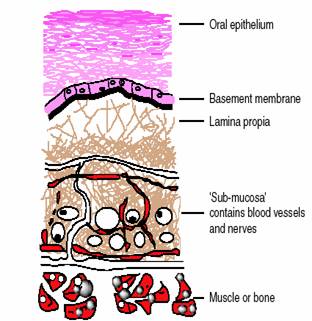The Epithelium
The vocal cords are covered by a mucus membrane which is in continuation with the mucus membranes of the nose, mouth and throat called the Epithelium. These are specialized cells which have several functions (secretion, absorption, protection, trans-cellular transport, sensation detection, and selective permeability).
 It is this layer that vibrates when your vocal cords phonate (see Phonation) and which permit you to become sensitive to your vocal cords. The muscles and ligaments of the vocal cords do the pitch adjustment by lengthening and thinning for high notes and shortening and thickening for low notes (see Vocal Cords), but it is the mucosal layer or epithelium which does the actual vibrating. Because the epithelium is so sensitive, being made of a mucus membrane, it is susceptible to irritation and dehydration. The two most common irritants are infection and allergies, although fatigue can also irritate this mucosal layer. Some singers have even had to change their career path, or abandon it altogether, due to an allergy problem which is very unfortunate. Dehydration is another factor that greatly affects the vibration of the vocal cords which is why singers drink a lot of water in general and especially while singing.
It is this layer that vibrates when your vocal cords phonate (see Phonation) and which permit you to become sensitive to your vocal cords. The muscles and ligaments of the vocal cords do the pitch adjustment by lengthening and thinning for high notes and shortening and thickening for low notes (see Vocal Cords), but it is the mucosal layer or epithelium which does the actual vibrating. Because the epithelium is so sensitive, being made of a mucus membrane, it is susceptible to irritation and dehydration. The two most common irritants are infection and allergies, although fatigue can also irritate this mucosal layer. Some singers have even had to change their career path, or abandon it altogether, due to an allergy problem which is very unfortunate. Dehydration is another factor that greatly affects the vibration of the vocal cords which is why singers drink a lot of water in general and especially while singing.
It is the Epithelium that has sensation and allows you to feel your cords while vibrating (see Phonation). It is also the Epithelium that will sense the irritation from overuse, dryness from dehydration or pain from abuse of your voice. Professional singers become highly sensitive in this area and learn to take care of their voice before problems start. They can usually feel vocal fatigue before most non-singers. It manifests as a slight soreness in the throat, almost imperceptible, the day before a cold really takes hold. It’s recommended, if you are able, to take lots of vitamin C at these times, stay hydrated and get a good night’s rest; in this way a more serious cold may be avoided. With practice, you can develop this sensitivity too and learn to maintain your health.
For more information or to book a private lesson, please go to the contact page.
-
Respiratory epithelium - Mucosa, goblet cells and basement membrane
 Montreal Voice Coach
Montreal Voice Coach